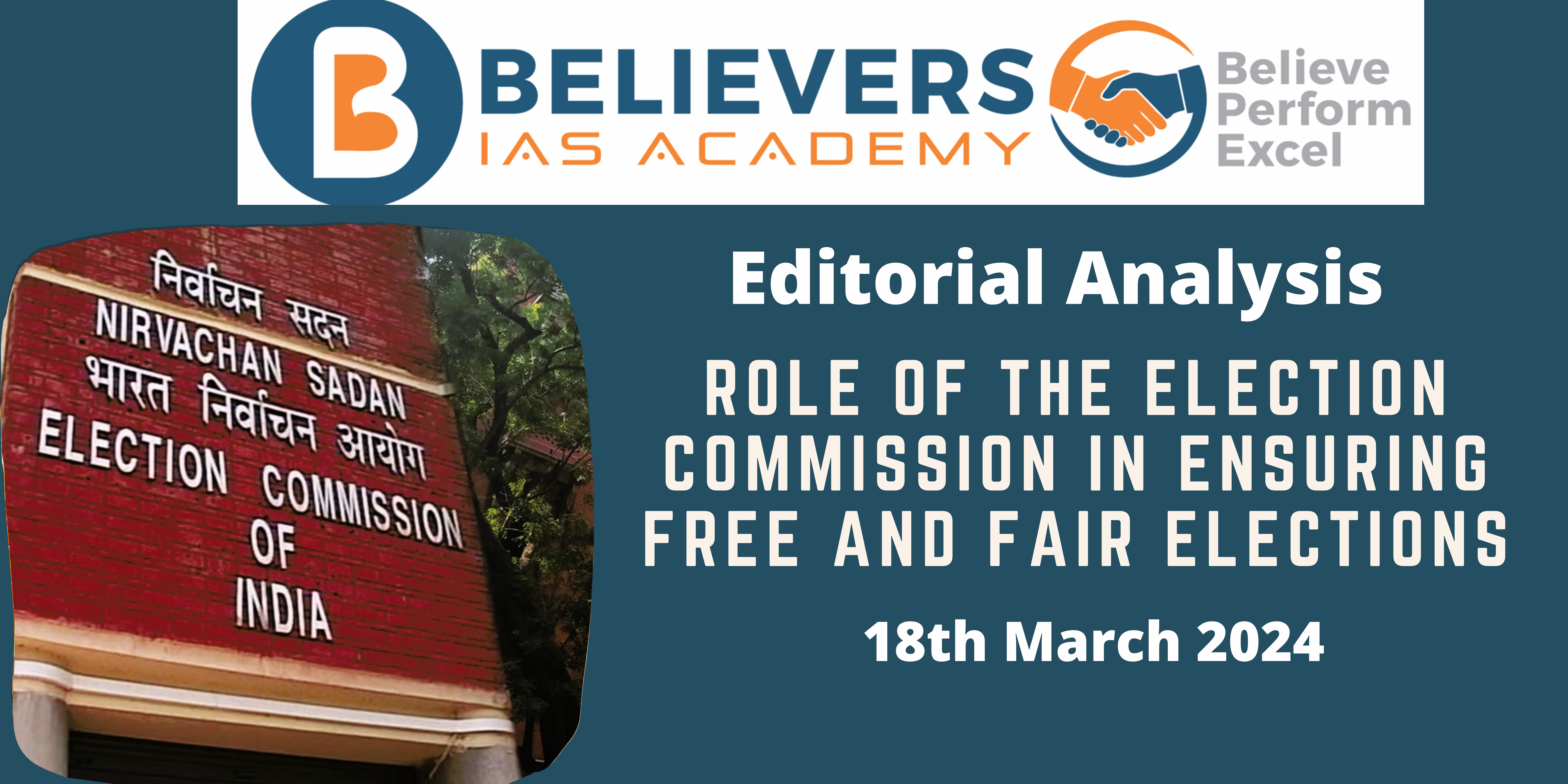Role of the Election Commission in Ensuring Free and Fair Elections
Context:
The announcement of the 18th Lok Sabha election and the revelations around the electoral bond scheme, alongside the recent exit of the Election Commissioner of India from his post, has painted a deep disturbing pattern of shrinking fairness in the election process.
Relevance:
GS-02 (Polity, Governance)
Mains Question:
Discuss the challenges to electoral integrity and transparency in India. Suggest measures to strengthen the electoral process and uphold democratic principles in the country. (250 words)
Facts for Prelims:
- Part XV (Article 324-329) deals with elections and establishes a commission for these matters.
- Article 326: Elections to the House of the People and to the Legislative Assemblies of States to be based on adult suffrage.
- Article 325: No person to be ineligible for inclusion in, or to claim to be included in a special, electoral roll on grounds of religion, race, caste or sex.
- Article 327: Power of Parliament to make provision with respect to elections to Legislatures.
- Article 328: Power of Legislature of a State to make provision with respect to elections to such Legislature.
- Anoop Baranwal vs Union of India Case, 2023: The Supreme Court ruled that the appointment of the Chief Election Commissioner and Election Commissioners should be made by the President upon the recommendation of a Committee which includes the Prime Minister, the Leader of the Opposition in the Lok Sabha, and the Chief Justice of India.
- In absence of Leader of the Opposition- the leader of the largest opposition party in the Lok Sabha will participate in the committee.
Dimensions of the Article:
- Election Commission of India
- Structure of ECI
-
CEC and Other EC (Appointment, Conditions of Service and Term of Office) Bill, 2023.
- Challenges to Electoral Integrity and Transparency:
Election Commission of India:
- The ECI is established on 25th January, 1950 (National Voters’ Day).
- It is a Constitutional Body that administers Union(Lok Sabha, Rajya Sabha) and State elections (State Legislative Assemblies, State Legislative Councils) in India .
- It also administers the elections for the offices of President and Vice-President. However, elections to Panchayats and Municipalities is under the State Election Commission.
- The Election Commission draws authority from the Constitution as per Article 324 and the Representation of the People Act.
Structure of ECI:
- Initially, the commission had only one election commissioner.
- The enactment of the Election Commissioner Amendment Act in 1989 turned the commission into a multi-member body: a 3-member Commission.
- It is composed of the Chief Election Commissioner (CEC) and any additional election commissioners appointed by the President as deemed necessary.
- Currently, the commission is constituted by the CEC alongside two Election Commissioners (ECs).
- At the state level, the election commission receives assistance from the Chief Electoral Officer.
- Tenure of election commissioners: Not prescribed by Indian Constitution.
- Election Commission Act, 1991: States that Chief Election Commissioner or an Election Commissioner shall hold office for a term of six years, or up to the age of 65 years, whichever is earlier, from the date on which he/she assumes his/her office).
CEC and Other EC (Appointment, Conditions of Service and Term of Office) Bill, 2023.
Key Provisions of the Act:
- Replacement of Previous Act: The legislation supersedes the 1991 Election Commission Act, concentrating on the appointment, pay, and termination of the Chief Election Commissioner (CEC) and Election Commissioners (ECs).
- Appointment Process:
- The President appoints the CEC and ECs upon the Selection Committee’s recommendation.
- The Committee includes the Prime Minister, a Union Cabinet Minister, and the Leader of the Opposition or the largest opposition party’s leader in the Lok Sabha.
- Recommendations remain valid during committee vacancies.
- A Search Committee, led by the Cabinet Secretary, proposes candidates.
- Eligibility requires experience equivalent to a central government Secretary.
- Salary and Conditions: The CEC and ECs will now receive remuneration and service conditions comparable to the Cabinet Secretary, contrasting with the prior alignment with a Supreme Court Judge’s salary.
- Removal Process:
- The law maintains Article 324(5), permitting the CEC’s removal akin to a Supreme Court Judge.
- ECs can only be removed with the CEC’s recommendation.
- Protection for CEC and ECs: The legislation shields the CEC and ECs from legal actions related to their official duties during their tenure, safeguarding them from civil or criminal proceedings.
- Aim of Amendment: The amendment aims to safeguard these officials from legal repercussions tied to their official functions, ensuring their effectiveness and independence.
Challenges to Electoral Integrity and Transparency:
- Unfair Advantage for Major Political Parties: Candidates from larger political parties often enjoy unfair advantages over candidates from smaller parties, primarily due to disparities in wealth and resources.
- Issue of Nepotism: Nepotism plays a significant role in politics, where individuals with family connections often gain undue advantages, leading to skilled individuals losing opportunities.
- Corruption in Election Processes: Corruption during elections, such as buying and selling votes, poses a significant challenge to ensuring free and fair elections. This undermines the integrity of the electoral process and affects the outcome.
- Manipulation of Election Commission: Political players sometimes manipulate or influence the Election Commission’s decisions and processes, compromising the impartiality and effectiveness of the electoral body.
- Lack of Level Playing Field: Despite efforts to ensure a level playing field, candidates with criminal affiliations or significant financial backing often have an unfair advantage over other candidates, impacting the fairness of elections.
Conclusion:
The ECI must uphold its mandate as the guardian of democracy and ensure that the electoral process remains a beacon of transparency, accountability, and inclusivity. By addressing the challenges posed by political interference, electoral malpractices, and institutional deficiencies, India can reaffirm its commitment to democratic principles and strengthen its democratic institutions.



